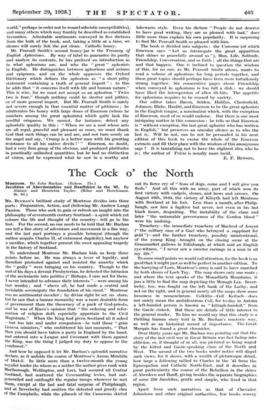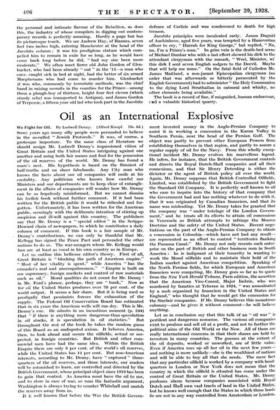The Cock o' the North
Montrose. By John Buchan. (Nelson. 21s.)
Mn. BUCHAN'S brilliant study of Montrose divides into three parts : Preparation, Action, and (following Mr. Andrew Lang) Passion. Those who seek to gain or refresh an insight into the philosophy of seventeenth century Scotland—a spirit which yet colours the life and thought of the country—will go to the first. For the second, no one needs to be told that Mr. Buchan can tell a fine story of adventure and movement in a fine way, and the last part portrays a possible betrayal (though the author acquits Charles II, of extremest duplicity), but anyhow a sacrifice, which together present the most appealing tragedy in the history of Scotland.
To understand Montrose Mr. Buchan bids us keep three points before us. He was always a lover of legality, and therefore protested against and resisted the anarchy which the " godly " were bringing on his country. Though to the end of his days a devout Presbyterian, he detested the intrusion of the ecclesiastic into politics (" Bishops, I care not for them. I never intended to advance their interests "—were among his last words) ; and " above all, he had made a central and inviolable sovereignty the foundation of his creed." Montrose was no sentimental cavalier ; by divine right he set no store, but he saw that a human monarchy was a more desirable form of government than the theocracy of a pack of God-priests, and he was of Knox's opinion that " the ordering and refor- mation of religion doth especially appertain to the Civil Magistrate." When the King had given Scotland all it asked —but too late and under compulsion—he told those " grim Geneva ministers," who embittered his last moments, " That then you should have taken a party in England by the hand, and entered into a League and. Covenant with them against the King, was the thing I judged my duty to oppose to the yondmost."
And how he opposed it let Mr. Buchan's splendid narrative declare, as it unfolds the course of Montrose's Annus Mirabilis of 1644-5. In little more than a twelve-month the young royalist leader (to whom as a soldier the author gives rank with Marlborough, Wellington, and Lee), had scoured all Central Scotland, had scattered the Covenanting levies, had out- generalled and outfought the regular troops wherever he met
them, except at the last and fatal surprise of Philiphaugh,
and at Inverloehy had smitten the detested and greedy clan of the Campbells, while the pibroch of the Camerons skirled out its fierce cry of " Sons of dogs, come and I will give you flesh." And all this with an army, part of which won its first victory with cudgels, stones, and bows and arrows. On August 16th, 1645, the victory of Kilsyth had left Montrose with Scotland at his feet. Less than a month, after Philip- haugh, saw him a fugitive but never, not even in his last black hours, despairing. The instability of the clans and later " the untamable perverseness of the Gordon blood " were his undoing.
Treachery—the immediate treachery of Macleod of Assynt (" the solitary case of a Gad who betrayed a suppliant for gold ")—and the further treachery, possibly unintentional, of the young King—brought on the closing scene at the Grassmarket gallows in Edinburgh, at which said an English eye-witness, " I never saw a sweeter carriage in a man in all my life."
To some small points we would call attention, for the book is so good that it might just as well be perfect in another edition. To the harrying of Lorn, Montrose's army is said to have marched
by both shores of Loch Tay. The map shows only one route ; and where the text speaks of the Monadliath Mountains, it
jars a little to find the map depicting the Monagh Lea. Inver- lochy, too, was fought on the left bank of the Lochy, and not on the right, and in general nearly all the maps show some looseness in nomenclature. Colkitto—Coll Keitach—does not surely mean the ambidextrous Coll, for to-day in Antrim a left-handed person is known as " kittagh-handed," from
the Gaelic ciotach. But these are details of little interest to the general reader. To him we would say that this study is a thrilling human story told in Mr. Buchan's masterly way, as well as an historical record of importance. The Great Marquis has found a great chronicler.
Over thirty years ago Mr. Buchan was pointing out that the story of the last civil war in Great Britain was fast fading into oblivion, or, if thought of at all, was pictured as being waged by the kilted and Gaelic-speaking clans of the North and West. The second of the two books under notice will dispel such views, for it shows, with a wealth of picturesque detail, how large a following rallied to Charles in the '45 from the Episcopalian and Catholic North-East, and it describes in great particularity the course of the Rebellion in the shires of Aberdeen and Banff, giving besides the separate biographies of some 250 Jacobites, gentle and simple, who lived in that region.
Apart from such narratives as that of Chevalier Johnstone and other original authorities, few books convey the personal and intimate flavour of the Rebellion, as does this, the industry of whose compilers in digging out contem- porary records is perfectly amazing. Hardly a page but has its picturesque touch. We see Andrew Hay, of Rannes, seven feet two inches high, entering Manchester at the head of the Jacobite column ; it was his prodigious stature which com- pelled him to remain in exile for so long, as he would have come back long before he did, " had my size been more moderate." We often meet fierce old John Gordon of Glen- bucket, who had been already " out " in the '15—a man who once, caught sick in bed at night, had the better of six armed Maephersons who had come to murder him. Glenbucket it was who, commonly by terroristic methods, was the chief hand in raising recruits in the counties for the Prince—among them a plough-boy of thirteen, height four feet eleven (which sturdy rebel was transported to Antigua), and James Gordon of Terpersie, a fifteen year old lad who took part in the Jacobite defence of Carlisle and was condemned to death for high treason.
Jacobite principles were inculcated early. James Duguid of Auehinhove, aged five years, was tempted by a Hanoverian officer to cry, " Hurrah for King George," but replied, " Na, na, I'm a Prince's man." In grim vein is the death-bed scene of Michael Dunbar who with a last effort showed his dirk to the attendant clergyman with the remark, " Weel, Minister, wi' this dirk I sent seven English sodgers to the Deevil. Maybe that will help me some." On the fatal field of Culloden Mr. James Maitland, a non-jurant Episcopalian clergyman (an order that was afterwards so bitterly persecuted by the English Government) had to administer " the Holy Communion to the dying Lord Strathallan in oatmeal and whisky, no other elements being available."
The book is a record of fine, if misguided, human endeavour, r nd a valuable historical quarry.





































 Previous page
Previous page